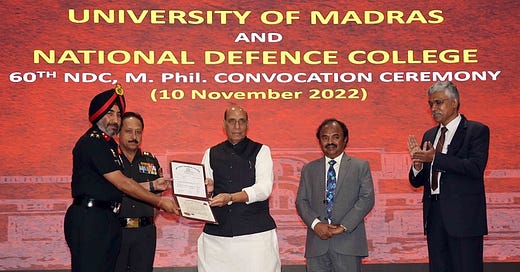India’s Enlightened Self-Interest & Strategic Morality Concepts Are Important
India’s vision is one where all responsible members of the international community keep others’ legitimate interests in mind when pursuing their own in order to avoid inadvertently disrupting the complex relations of interdependence tying them together and thus counterproductively harming their own interests in the process.
Indian Defense Minister Rajnath Singh shared some insight into his rising multipolar Great Power’s grand strategy while speaking at the 60th National Defense College course in New Delhi. According to him, India is guided by enlightened self-interest and strategic morality, which are important concepts for every responsible member of the international community to learn from. Simply put, they translate to collective security, developmental assistance, multi-alignment, and respect for international law.
These positions in and of themselves aren’t anything new, but the perspective through which India interprets and practices them is. By framing everything according to enlightened self-interest and strategic morality, the world’s largest developing country is able to inspire others to adhere to these agreed-upon standards upon leading by example. This isn’t high-sounding rhetoric but an accurate reflection of Indian policy in the present day.
This multipolar Great Power’s rise to kingmaker status in the New Cold War between the US-led West’s Golden Billion and the jointly BRICS- and SCO-led Global South of which it’s a part was made possible through the perfection of its balancing act between both de facto blocs since the latest phase of the Ukrainian Conflict began in late February. India became Russia’s irreplaceable valve from Western pressure, preemptively averted its disproportionate dependence on China, and thus changed the world.
The global systemic transition to multipolarity is now in track to breeze through a brief tripolarity phase between America, China, and the joint Russian-Indian-Iranian pole of influence prior to evolving into its final form of more complex multipolarity (“multiplexity”). It therefore naturally follows that it’s incumbent upon India to flex its newfound leadership in global affairs, ergo the reason why its Defense Minister timed the unveiling of these complementary concepts for guiding its grand strategy.
Enlightened self-interest and strategic morality are already actively practiced with respect to India’s balancing act between both previously mentioned de facto New Cold War blocs and will also serve as the framework for its growing relations with the Global South. About the second-mentioned, India’s rapid rise is resulting in it being able to credibly function as a friendly multipolar alternative to China in a similar sense to the role that it presently plays with respect to Russia.
The vast majority of humanity residing in the Global South doesn’t want to take sides in the New Cold War yet still feels increasingly pressured to do so. Their mutually beneficial relations with the People’s Republic are regrettably misportrayed by the declining US hegemon in a zero-sum way, hence why some might be reluctant to further expand them out of fear of triggering its wrath. With that in mind, India becomes an attractive third-party balancing force due to its neutrality.
On that topic, India’s balancing act was perfected over the past year precisely because its visionary leadership led by Prime Minister Modi and represented across the world by External Affairs Minister Jaishankar retained their pragmatic policy of principled neutrality towards the Ukrainian Conflict. This in turn enabled it to retain strategic ties and trust with both de facto New Cold War blocs as well as pioneering the approach that the rest of the Global South will soon follow.
There’s no doubt that enlightened self-interest inspired this policy and that strategic morality served to convince India to continue with it despite immense US pressure. This multipolar Great Power experienced firsthand exactly how disruptive the Ukrainian Conflict has been for the global food and fuel markets. It therefore realized that unilaterally conceding on its objective national interests with respect to its mutually beneficial relations with Russia in order to please the US would be counterproductive.
This explains why its Defense Minister spent so much time elaborating on the interconnectedness of contemporary International Relations, the observation of which forms the partial basis for his country’s enlightened self-interest and strategic morality. It’s not just food and fuel that tie the world together, but also information-communication technologies, which led to him condemning the increasingly disruptive potential of cyberattacks and information warfare.
India’s vision is one where all responsible members of the international community keep others’ legitimate interests in mind when pursuing their own in order to avoid inadvertently disrupting the complex relations of interdependence tying them together and thus counterproductively harming their own interests in the process. This is of course easier said than done but nevertheless remains a noble objective to pursue at the global level like India is intent on doing across the coming future.
To wrap it all up, enlightened self-interest and strategic morality basically mean that countries should prioritize their security and development without doing so at other’s expense. This guiding principle requires a careful balance between everyone’s interests but isn’t impossible to pull off as evidenced by India having perfected its approach across the past year. Looking forward, there’s no doubt that it’ll retain its kingmaker status in the New Cold War through the pragmatic application of this vision.




